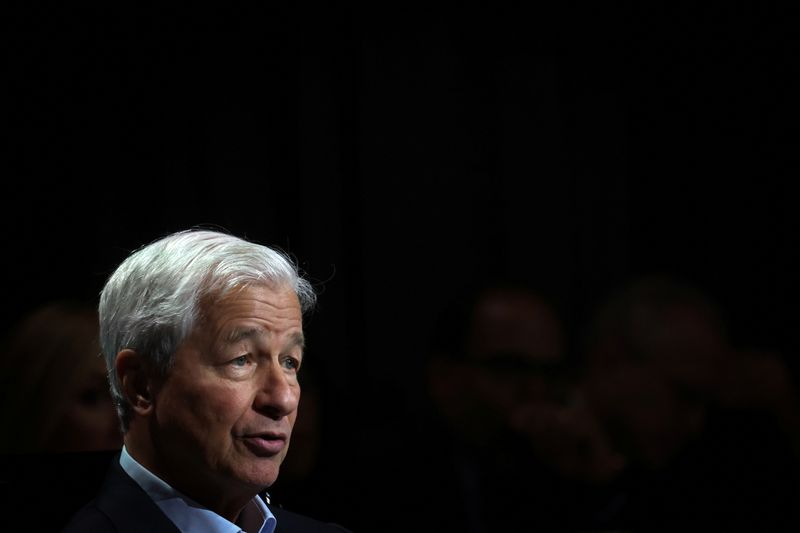By Ross Kerber
(Reuters) - JPMorgan Chase & Co (NYSE:JPM) CEO Jamie Dimon recently confronted public pension fund managers about channeling more of their investments into private assets, a trend he said could be at odds with their stated policy concerns.
"You call me up and talk to us about all the issues you're interested in. But when you make huge investments in the private side, you don't get that kind of transparency," he told a meeting of the Council of Institutional Investors in New York on Sept 10.
The gathering included many public pension fund officials, whose decisions Dimon said are a major reason many more companies are now choosing to raise capital outside U.S. public equity markets.
There could be 15,000 publicly traded companies in the U.S. rather than around 4,500 today, Dimon suggested. Instead private markets have taken up a major share of new investments without nearly as much disclosure, liquidity or research, the JPMorgan CEO said.
"You all are huge causes of that, because you make huge investments on the private side," Dimon told the audience that included representatives from Democratic-leaning state and local pension systems that have taken activist stances on environmental and social issues.
Dimon's message, that funds' private investments may be undercutting their public activism, is correct at least as far as the investment trends. Money allocated to private assets rose from $129.2 billion in the 2003 fiscal year to $923.4 billion in fiscal 2022, the latest year available, according to estimates by the National Association of State Retirement Administrators.
The figures were based on disclosures by more than 200 US public-sector pension plans reflecting more than 90 percent of all public pension assets.
Among those plans allocations to private assets grew from 5.6% in 2003 to 17% in 2022, NASRA estimated. The allocations included private debt, private credit, private equity and private real estate.
Keith Brainard, NASRA's research director, said public funds initially embraced private assets to diversify their holdings and that private equities generally performed very well over the past 10 and 20 years, less so more recently.
Critics have raised concerns for years about lack of transparency in areas like private equity and the public impact of some investments.
Alyssa Giachino, director of investor engagement for the Private Equity Stakeholder Project, a Chicago nonprofit, pointed to the case of bankrupt hospital operator Steward Health Care and its former private equity owners, where land sales have been blamed for leaving the business on shaky financial footing.
But Giachino and others told me they expect U.S. public pension funds' private allocations to keep going up. For one thing private vehicles give managers easier access to asset classes like corporate debt, said Jay Love, a partner in the investment practice of Mercer (NASDAQ:MERC), a unit of Marsh & McLennan.
While private markets face performance challenges, "their private nature gives them greater flexibility to transform and generate higher returns for their investors. Public plans are increasing allocations to private investments to achieve their objectives, but not all will be successful as more capital flows into this area," Love said.
One system moving more to the private side is the California Public Employees' Retirement System, the largest in the U.S. and one of the most vocal on environmental, social and governance issues.
On March 19 CalPERS said it was increasing its total private market allocation to 40% from 33% of plan assets, which were $502.9 billion as of June 30. It cited a study showing strong private equity returns.

Asked about Dimon's comments, CalPERS Chief Investment Officer Stephen Gilmore said via e-mail that "We agree with the need to focus on a long-term horizon in both our public and private investments. That’s why CalPERS has been working towards improving transparency in private markets, where we see unique opportunities that will help us meet future obligations to our members’ retirement security.”
CalPERS has backed an initiative to generate more ESG data for the private equity industry.